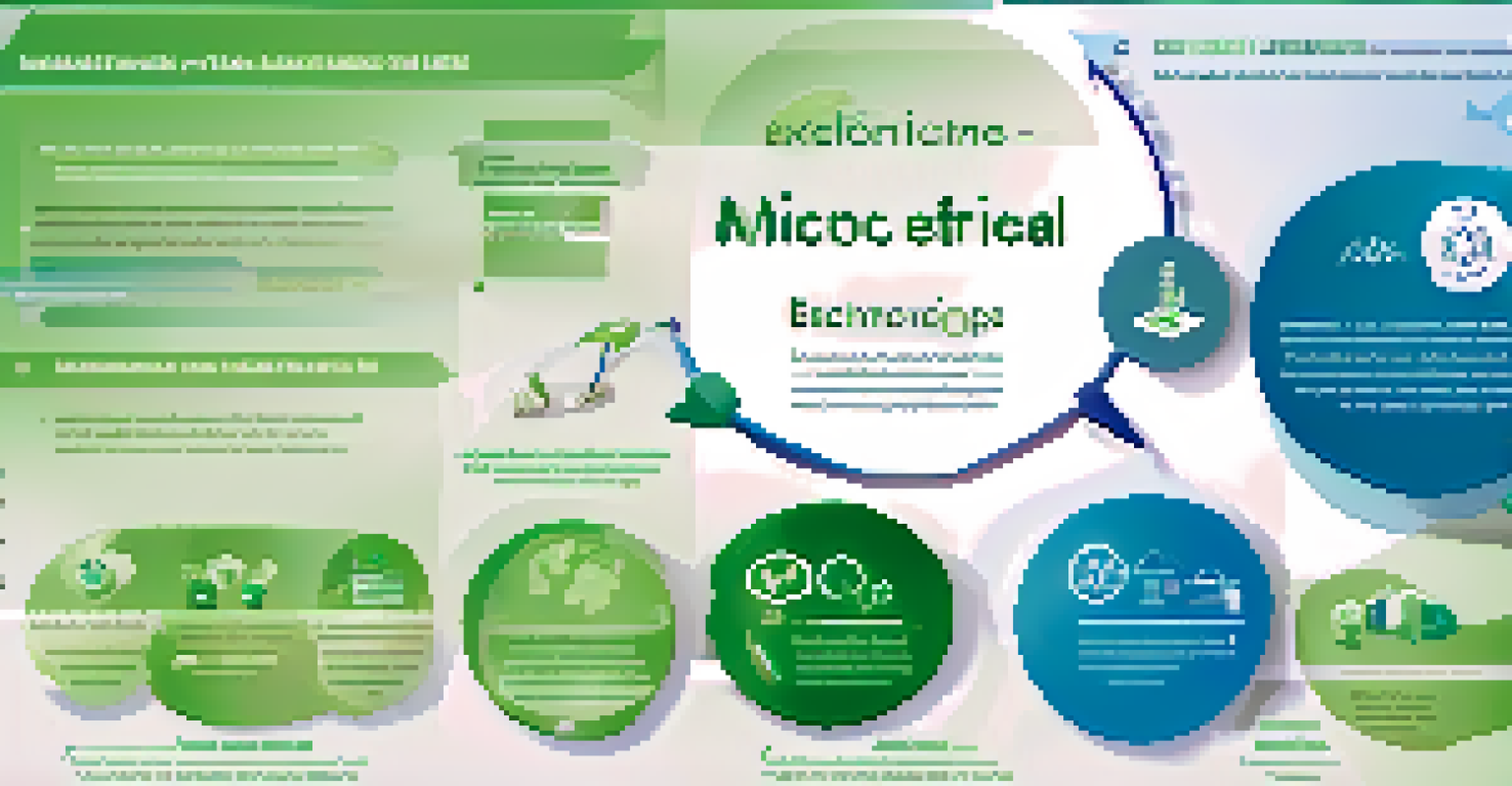Micro-Credentials: Enhancing Professional Development Paths

Understanding Micro-Credentials and Their Importance
Micro-credentials are bite-sized qualifications that demonstrate specific skills or knowledge. They are designed to be more flexible and accessible than traditional degrees, catering to the evolving needs of today’s workforce. With industries advancing rapidly, micro-credentials provide a way for individuals to stay relevant and competitive in their fields.
In today's rapidly changing job market, the ability to adapt and learn new skills is more important than ever.
These credentials often focus on niche areas, allowing professionals to gain expertise in specialized subjects without committing to long-term programs. For instance, an IT professional might earn a micro-credential in cybersecurity without pursuing a full degree in information technology. This targeted approach makes learning manageable and tailored to individual career goals.
As more employers recognize the value of these credentials, they are becoming a popular choice for those looking to enhance their skill set. Whether it’s learning a new software tool or mastering a marketing strategy, micro-credentials offer a pathway to professional growth that is both practical and efficient.
The Benefits of Micro-Credentials for Professionals
One of the most significant advantages of micro-credentials is their flexibility. Professionals can often complete them at their own pace, fitting learning into busy schedules without the pressure of traditional coursework. This adaptability is particularly valuable for those balancing work, family, and ongoing education.

Another benefit is the cost-effectiveness of micro-credentials. Compared to full degrees, these short courses are typically more affordable, making skills development accessible to a broader audience. This democratization of education empowers individuals to invest in their growth without incurring massive debt.
Micro-Credentials Enhance Skills
Micro-credentials provide targeted, flexible learning opportunities that help professionals stay competitive in their fields.
Moreover, many micro-credential programs are industry-recognized, enhancing their value in the job market. When employers see these qualifications on a resume, they often equate them with a commitment to professional development and a proactive approach to skill acquisition.
How Micro-Credentials Fit into Career Advancement
Micro-credentials can serve as stepping stones in a person’s career journey. They allow professionals to showcase their commitment to learning and adaptability, which are highly valued traits in today’s job market. Employers are increasingly looking for candidates who are eager to upskill and evolve.
Education is the most powerful weapon which you can use to change the world.
For example, a marketing professional may earn a micro-credential in digital analytics, which could lead to new job opportunities or promotions. By demonstrating this specialized knowledge, they not only enhance their own capabilities but also increase their value to their employer.
In addition, having a portfolio of micro-credentials can differentiate candidates in a competitive job search. Hiring managers often appreciate the initiative shown by candidates who actively seek out additional training and certifications, paving the way for career growth.
Choosing the Right Micro-Credentials for Your Goals
Selecting the right micro-credentials can be pivotal in achieving your career aspirations. It’s important to align your learning choices with your professional goals and the skills in demand within your industry. Researching trending skills and employer expectations can inform your decision-making.
Many platforms offer a variety of micro-credential options, from universities to online learning portals. Take the time to evaluate the credibility of the providers and the relevance of the courses to your field. Reading reviews and checking industry recognition can also help in making an informed choice.
Flexible Learning for Busy Lives
These bite-sized qualifications allow individuals to learn at their own pace, making education accessible for those balancing work and personal commitments.
Ultimately, the goal is to select micro-credentials that not only enhance your resume but also ignite your passion for learning. When you choose courses that genuinely interest you, you’ll be more motivated and engaged, leading to a more rewarding professional development experience.
The Role of Employers in Supporting Micro-Credentials
Employers play a crucial role in the micro-credential ecosystem by recognizing and supporting their employees' pursuit of these qualifications. Many companies are now investing in training programs that offer micro-credentials as a way to enhance their workforce's skills. This not only benefits employees but also strengthens the organization as a whole.
By encouraging employees to pursue micro-credentials, companies foster a culture of continuous learning and professional growth. This can lead to increased job satisfaction, lower turnover rates, and a more skilled workforce ready to tackle new challenges.
Furthermore, employers can collaborate with educational institutions to develop tailored micro-credential programs that meet specific business needs. This partnership not only enhances employee skills but also helps organizations stay competitive in their respective markets.
The Future of Micro-Credentials in Education
As the landscape of education continues to evolve, micro-credentials are likely to play an increasingly significant role. Educational institutions are starting to integrate these smaller qualifications into their offerings, making them a staple in professional development strategies. This shift reflects a growing recognition of the need for flexible, skills-based learning.
Technology is also driving the expansion of micro-credentials, with online platforms making it easier for learners to access courses from anywhere in the world. This accessibility broadens the reach of micro-credentials, allowing individuals to learn at their convenience and pace.
Employers Value Micro-Credentials
As more companies recognize the importance of micro-credentials, they support employees in pursuing these qualifications, fostering a culture of continuous learning.
Looking ahead, we may see an even greater emphasis on competency-based education, where learners can earn micro-credentials by demonstrating their skills through practical assessments. Such innovations will further validate the importance of micro-credentials in shaping the future of education and professional development.
Conclusion: Embracing Micro-Credentials for Career Growth
In conclusion, micro-credentials offer a valuable opportunity for professionals seeking to enhance their skills and advance their careers. Their flexibility, cost-effectiveness, and industry recognition make them a smart choice for anyone looking to stand out in today’s job market. By embracing these qualifications, individuals can take charge of their professional development paths.
As both employers and educational institutions recognize the importance of micro-credentials, the future looks bright for this innovative approach to learning. Whether you’re just starting your career or looking to pivot into a new field, micro-credentials provide a practical solution for skill enhancement.

Ultimately, investing in micro-credentials is an investment in yourself and your future. By continually learning and adapting, you can ensure that your career path is both fulfilling and successful.